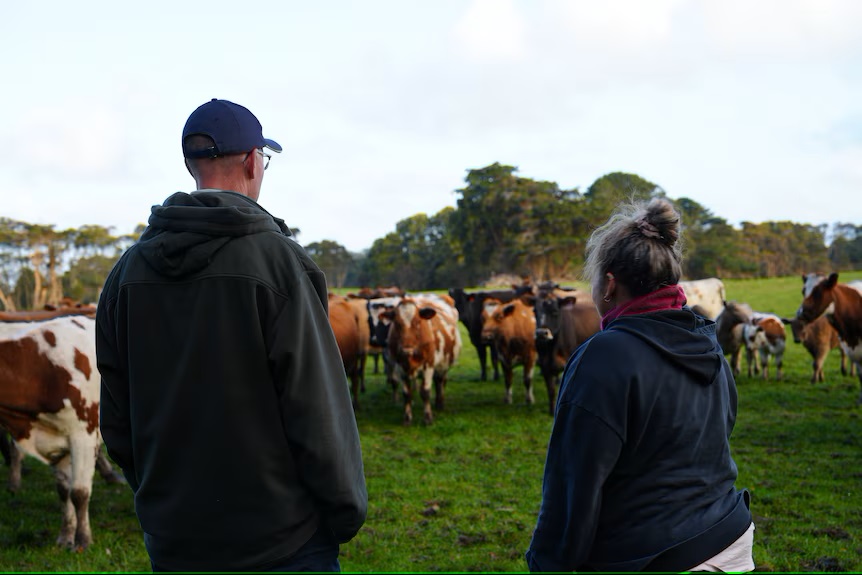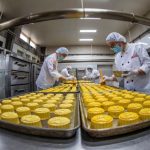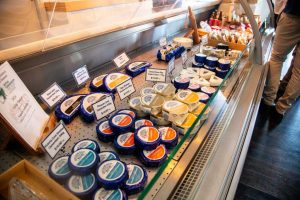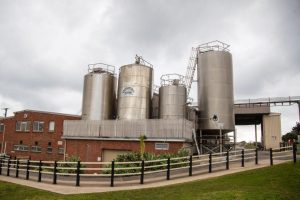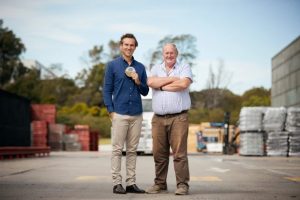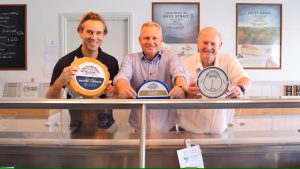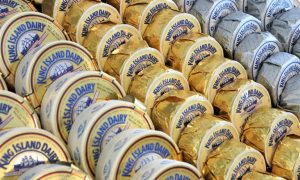
King Island Dairy is the largest single employers on the Bass Strait island, but the factory and associated cheese brand is set to be closed next year.
It’s one of a number of major industry closures that have rocked the small Tasmanian island community in recent decades, with workers forced to consider if they have to move away.
What’s next?
Premier Jeremy Rockliff says there’s “still hope” that the factory will be sold, with King Islanders similarly refusing to give up.
For decades, successive waves of economic change have battered King Island, closing various major industries and pushing workers off the tiny Bass Strait island.
And it’s happening again now.
“I, myself, will probably have to sell and leave the island,” cheesemaker Tam Ghazarian said.
Tam is a senior cheese maker at King Island Dairy, a Saputo cheese brand. (ABC News: Jordan Young )
Earlier this month the largest employer on the island, King Island Dairy, announced the next season of cheesemaking would be its last, and the factory would shut down in mid-2025 after the Canadian-based owner Saputo failed to find a buyer.
“It’s incredibly disappointing, from a worker’s point of view, to put it lightly,” Mr Ghazarian said.
“A lot of people … they’re going to have a real struggle in terms of finding employment on the island, it is a limited employment base.”
The cost of life in paradise
Fewer than 2,000 people live on the remote and rugged King Island, fostering a close-knit community. (ABC News: Monte Bovill)
It’s not the first time industrial transformation has loomed on King island. It’s not even the first time a multinational has bought a local business, only to close it later.
Irene Robins and Ruth McFadzean are members of the King Island Historical Society, which has tracked much of the island’s recent history.
King Island residents Irene Robins and Ruth McFadzean have volunteered countless hours of their time to the King Island Historical Society Museum. (ABC News: Jordan Young )
“When I did grade one I had over 50 children in our class … with just one teacher,” Mrs Robins recalled.
“It was a thriving community when we first came … the Grassy Mine was just beginning to downsize when we came in the early ’80s but still we had a very vibrant population,” Mrs McFadzean added.
The Dolphin Tungsten Mine in Grassy recommenced operations last year, after a three-decades-long closure. (ABC News: Morgan Timms)
Mining and agricultural prosperity bloomed on King Island in the twentieth century, swelling the population to 3000 people.
Fuelled by lush pastures, year-round rainfall and coastal waters brimming with abalone and rock lobster, the island developed a bustling local sport scene, four schools and a relaxed, friendly atmosphere.
At its peak, the scheelite mine at Grassy employed 500 people, before depressed tungsten prices in the 1990s sealed its fate in 1992.
“The sporting clubs, that’s probably where it hit the most,” Mrs Robins said.
Irene and Ruth say the drop in the population is particularly evident in its sporting clubs. (ABC News: Jordan Young )
“There’s no tennis, no darts … all those things suffered.”
About 20 years later, the island’s next biggest employer was shut by its multinational owners, JBS.
That was the island’s only abattoir, and employed 80 people. Many of those moved away.
“Within, say, one or two years, you could see the impact from that and same when the scheelite mine closed in early 1990s,” Mrs McFadzean said.
“It made a huge impact on the island.”
Factory survives multiple owners, bailouts, administration
King Island Dairy has become an iconic brand, and not just on the island. (ABC News: Ebony ten Broeke)
By the mid-2010s, the King Island Dairy cheese factory had become the largest single employer.
But despite the brand’s growth, it wasn’t smooth sailing — with a history plagued by financial difficulties and subsequent reinvention, a government bailout, a failed merger and cash-flow issues.
“I was the original wrapper of the brie when they first started it,” Mrs Robins said, recalling the dairy’s pioneering efforts to get soft cheeses into Australian supermarkets.
“We all did that by hand until … they decided to get a machine. But a few of us, we decided we could wrap quicker than the machine.”
Although popular in supermarkets nationwide, that didn’t necessarily translate to growth.
According to the Australian Bureau of Statistics, dairy manufacturing jobs on the island dropped by 44 per cent between 2006 and 2021, down to 69.
During that time, the factory survived three different corporate owners, including Japan-based Kirin and Canada’s Saputo, which owns it now.
In 2024, those numbers sit just below 60, according to Saputo.
Workers left with nowhere to go
Tam has lived on King Island for more than a decade, but is now faced with having to leave. (ABC News: Jordan Young )
One of those workers is Mr Ghazarian, who moved to the island 11 years ago for a change of pace.
“Cheesemaking is really interesting. It’s fantastic work and lovely people so just ticked all the boxes for me,” the cheesemaker said.
He said the news 10 months ago that yet another sale was on the factory’s horizon shook the workforce to the core.
“It worried a lot of people, basically. You can read between the lines. We’re not idiots.
“You don’t show up with tonnes of HR people behind you and then talk to the workers and go, ‘considering [our] options’. People suddenly go, ‘ok, it’s serious, they’re looking at closing the factory’.”
News of the closure, although not surprising, has been devastating.
“It’s going to be a big problem for a lot of people out there to try and recover from this,” Mr Ghazarian said.
Milk supply slowly dries up
Kelly Lancaster and Philip Lancaster say the closure of the factory has been inevitable. (ABC News: Megan Powell)
Kelly and Phil Lancaster run one of the island’s two remaining family-owned dairy farms, and said many former dairy farms were switched over to beef as they were sold.
“This decision in the last couple of days — we were waiting for it,” Mr Lancaster said.
“We’ve kind of been waiting for it for like 10 years really,” Mrs Lancaster added.
Only two family-owned dairy farms remain on the island. (ABC News: Megan Powell)
“But just in the decline of the number of dairy farmers and everything … it’s been inevitable.”
The Lancasters are still supplying milk to the factory but made the decision last year to begin transitioning their farm, crossing their milking cows with beef bulls and even giving away dairy heifers as “home cows”.
They plan to sell up and leave the island to be closer to their children and grandchildren but hope that the island’s strong dairy history will continue.
Kelly Lancaster and Philip Lancaster are planning to move away, closer to family. (ABC News: Megan Powell)
Not ready to accept defeat
Many still hold hope a buyer for the dairy will swoop in at the last minute, including Tasmanian Premier Jeremy Rockliff.
“The factory is not closed yet,” he told King Islanders last week.
And the fight certainly isn’t over for many locals, including Mrs Robins.
“We’re King Islanders; we don’t give up.”
You can now read the most important #news on #eDairyNews #Whatsapp channels!!!
🇺🇸 eDairy News INGLÊS: https://whatsapp.com/channel/0029VaKsjzGDTkJyIN6hcP1K
